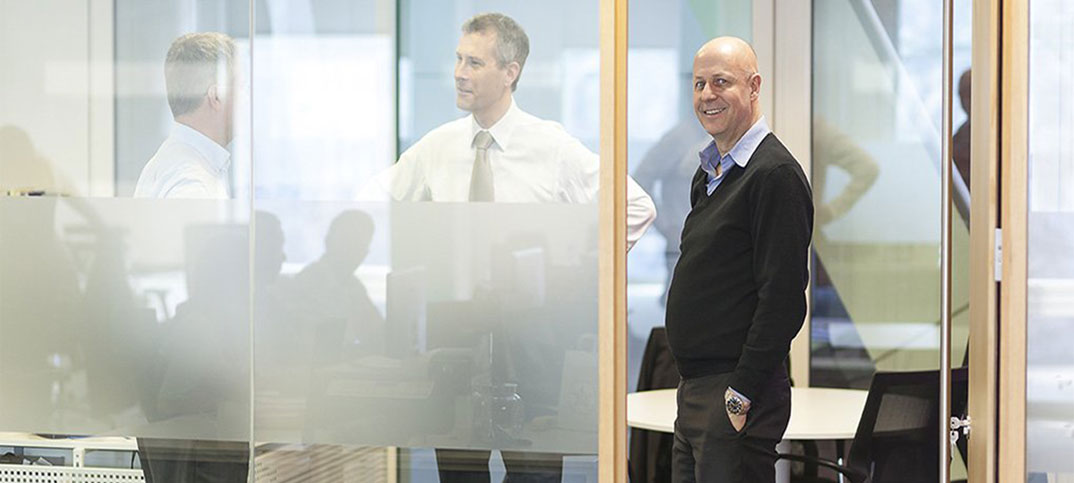Retail Express spoke to PayPoint boss Dominic Taylor one year on from its fallout with retailers over commission.
Last year, many retailers went to war with PayPoint after it introduced a cut in commission caps…
We don’t adjust commission often. We did last year and I don’t think we did it in a very elegant way. I’ve acknowledged publicly that we can do better for over a year now and I think we’re making good progress. Will I ever be satisfied? Maybe not. I know we’ve got a long way to go.
I’ve always said please don’t perceive commission to be the basis against what you should measure your relationship with us. It’s a contribution to your costs, but the real benefit is the footfall. Our consumers spend 58% more. If we don’t deliver that footfall there’s a valid question to debate, but we’re confident we do.

How many retailers left PayPoint?
With respect to the retailers that left citing commission, there were less than the number of fingers on my hand. Don’t interpret that as my being complacent. The last thing I want PayPoint to be regarded as is a necessary evil. We need to change what we do so retailers realise the value we’re bringing.
So how are you changing?
We are doing a lot more at the moment about trying to focusing back in on the retail community. We’d been distracted by other things that we were doing before. I have personally got much closer to the business and we’re driving quite a lot of change – fundamentally around getting the right level of innovation to help retailers drive their businesses. We’re also becoming more understanding of what retailer issues are and being sympathetic to their concerns.
How do you plan to better understand retailers?
We’re working through the concept of a pledge to our retailers. It will be a series of statements on what we’re there to do for retailers and be held to account for it. For example, we want to promise to continue to innovate and try to drive new solutions.
I’m also not particularly happy about the level of service we provide to retailers. I want us to provide a much better level than we currently do. We’re encouraging all our senior managers to go into stores and find out what the issues are, to understand the retail community better.
We want to get away from the continuous argument that we don’t pay enough commission, and start to be held accountable for something else. There will be loads of response saying it’s rubbish and lots of cynics out there and that’s ok. There’s a big silent audience as well as a vocal audience.
Are you doing anything else to help the independent sector?
We relaunched our retailer forum last year. Through it we’re learning more about their stores and what the opportunities are from both sides.
While we can’t be held to be responsible for the fundamental things going on in the retail community – whether it’s the living wage of banking charges – we are definitely an organisation that could better represent some of those things outside. I want us to be more directly involved in what we do and also show a much higher level of empathy around the issues going on. We can’t solve their problems directly, but we can seek to understand them better and try to provide a stronger voice to represent their concerns in a way that a shop can’t do by itself.
We do have a voice and frankly I don’t think we’ve used that voice enough.

What does the future look like for PayPoint and its retailers?
I like to think we are one of the few organisations that spend quite a lot of time trying to work out what is going to happen to the local shop in the future. What sort of services do they need to provide? What are consumers going to demand through local stores in the future that will be enabled through technology?
We invest in technology to try and grow the business – obviously for our benefit, but also the benefit of the retailer.
What technology have you developed to prepare local shops for the future?
PayPoint One is going to roll out from late summer. It integrates everything PayPoint does in a fresher way includes core EPoS capability, so everything is managed through one device.It can deal with cards, contactless cards, Apple Pay and account-based payment mechanisms. We wanted to provide a device that future proofs payment solutions in store.
Some things we’ve embedded in it we won’t be using yet, like beacons that will be able to tell when specific customers have entered the store. It’s an opportunity for the future. Consumer facing screen – technically it’s a touchscreen. I’ve no idea how we’re going to use it yet.
We don’t always get it right, but we try very hard to invest in technology that will last a long time.
What response have you had?
We trialled it from just before Christmas to May. The acid test is whether they allowed us to take the second-generation terminal away and they have. We’re now running a commercial trial to work out how to charge for it.
Will every retailer have to switch to a PayPoint One terminal?
Over time, PayPoint One will become our chosen infrastructure and the current terminals will disappear. But it’s going to take us over three years to phase it out because we have thousands of retailers. We’re not forcing retailers to take PayPoint One. It’s entirely up to them.
How do you expect retailers to respond to the work you’re doing?
Some people get it really quickly and some people never get it no matter how hard you try and I’m sure we have every individual in our retail base. The important thing is we’re trying to make it better.





Comments
This article doesn't have any comments yet, be the first!